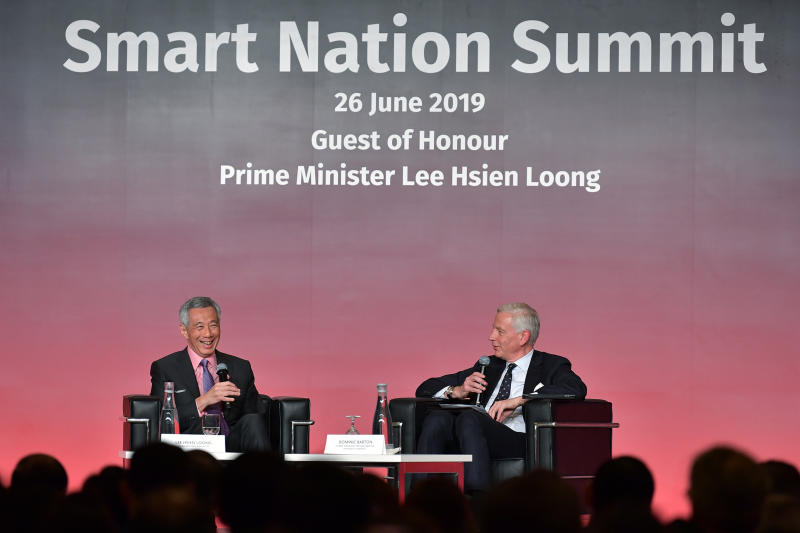3 ingredients necessary to succeed in smart nation vision: PM Lee Hsien Loong
Sign up now: Get ST's newsletters delivered to your inbox

Prime Minister Lee Hsien Loong at the Smart Nation Summit closing dialogue, Challenges for Next-Gen Leadership in a Digital-As-Usual Age, moderated by Mr Dominic Barton, global managing partner emeritus at McKinsey & Company, on June 26, 2019.
ST PHOTO: NG SOR LUAN
SINGAPORE - It is no secret that Prime Minister Lee Hsien Loong is a techie.
On Wednesday (June 26), he revealed that he puts his tech skills to good use as a mystery shopper on government websites, in a bid to help the Government improve its online services.
"Our mystery shoppers to government websites are kept busy, and once in a while I join them myself," he quipped to laughter. "It is not just improving the software, but rethinking and streamlining the underlying processes to focus on the essential requirements, and deliver the services in a customer-oriented way."
PM Lee was speaking at the Smart Nation Summit about Singapore's smart nation vision outlined five years ago.
While the country has a strong base to become a smart nation - a technologically literate population and good IT infrastructure, and the Government taking the lead - there are areas in which it can do better, he said.
He cited three ingredients that he said were necessary for Singapore to succeed in its vision to use technology to improve the quality of life for all.
First, Singapore must have very strong engineering capabilities, and must be able to attract and recruit engineers matching the calibre of the best tech companies in Silicon Valley and elsewhere, he said.
He pointed to how the Republic has made progress on this front, with universities here producing more IT graduates, and tech companies and banks setting up their engineering operations here.
But the public sector needs to be as good as the private sector, if not better, he added.
The Asean tech scene is thriving, he noted, and the Asean digital economy is projected to grow up to $240 billion by 2025.
Second, Singapore will also need more leaders and managers who understand enough about technology, both in government and in the private sector, he said.
This includes more engineers in the highest leadership positions who can make their own sound judgments on technological developments and also attract capable talent to work for them, he added.
Third, said PM Lee, society needs to embrace science and technology and not fear it.
"The Singapore ethos of our society has to be rational and transparent, able to examine and solve any problem rationally, prepare to apply solutions which work even if they are unconventional and use new approaches," he added. "People have to understand the risks of technology, whether on cyber security, whether it's privacy, or online falsehoods. But our people must not be anti-tech or anti-science, because that would hold back progress and it will be the end of us."
He cited the Digital Readiness Blueprint launched by the Ministry of Communications and Information last year to improve Singaporeans' access to technology and help them learn how to use digital technology safely.
Singapore's smart nation push, said PM Lee, is not about flaunting glitzy technology.
"It is applying technology to solve real problems that will make a difference to people's lives, across the whole of society," he added.
To this end, the Government has been building the basic infrastructure on which applications and services can be built, such as the National Digital Identity which will allow people to log in securely to access government services online.
It has also launched projects to address concrete problems, such as upgrading the 30-year-old TradeNet system used for shipping and port logistics to a new Networked Trade Platform, which can connect government agencies with shopping lines and logistics firms to better manage all aspects of the import and export of goods.
There have also been experimental projects for Singapore to learn quickly about novel technology, in areas such as autonomous vehicles, artificial intelligence and blockchain.
PM Lee cited the Immigration and Checkpoints Authority's passport application and Inland Revenue Authority of Singapore's tax payment as online services that are efficient, convenient and popular with citizens.
But he said: "But we can do much better, certainly for government services."
"Partly because as early adopters, we now have many legacy systems that need to be upgraded and rebuilt, while keeping the service running. We also need to keep up with new technology, to transform how we develop applications and deliver services."
For example, PM Lee said, the Government can explore using cloud services or centralising development, instead of having every agency build their own bespoke website or system at great expense.
The private sector also has a part to play, he said, adding that there are lot of opportunities for companies to adopt technology and create new areas of growth, especially in the financial services.
Wrapping up his speech, he said: "We are determined to achieve our Smart Nation vision. It is an essential strategy if Singapore is to remain an outstanding metropolis, abreast of the other centres of human creativity and enterprise."


